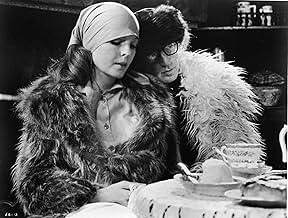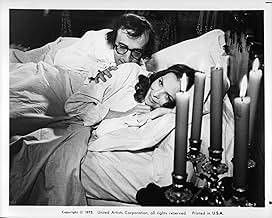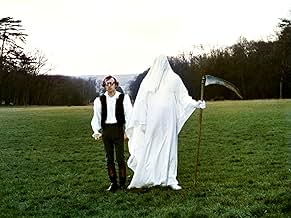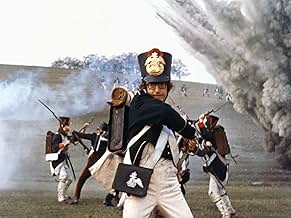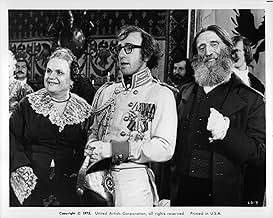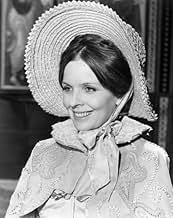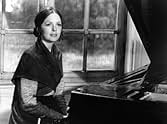CALIFICACIÓN DE IMDb
7.6/10
43 k
TU CALIFICACIÓN
En la Rusia de los zares, un soldado neurótico y su primo lejano planean el asesinato de Napoleón.En la Rusia de los zares, un soldado neurótico y su primo lejano planean el asesinato de Napoleón.En la Rusia de los zares, un soldado neurótico y su primo lejano planean el asesinato de Napoleón.
- Dirección
- Guionista
- Elenco
- Premios
- 1 premio ganado y 1 nominación en total
Féodor Atkine
- Mikhail
- (as Feodor Atkine)
Yves Barsacq
- Rimsky
- (as Yves Barsaco)
Gérard Buhr
- Servant
- (as Gerard Buhr)
Henri Czarniak
- Ivan
- (as Henry Czarniak)
- Dirección
- Guionista
- Todo el elenco y el equipo
- Producción, taquilla y más en IMDbPro
Opiniones destacadas
Watching Love And Death today I had the feeling that back when Woody Allen was going to Midwood High School in Brooklyn, a few years before I did, he was forced to do a book report on War And Peace and hated it. He vowed to get even with Tolstoy and all the rest of those heavy Russian dramatists and in Love And Death I do believe he succeeded.
And if you ever were forced to sit through all that turgid prose and heavy dramatics than Love And Death is the film you've longed for. The time is the Napoleonic Wars and the flower of Russian manhood is answering the colors. But Woody comes from a different patch than the other flowers bloomed in and he's not that crazy about sacrificing for old mother Russia.
The overall tone of Love And Death is a homage to Groucho Marx and years earlier I could have seen the Marx Brothers doing something like Love And Death with a bit more creative control, just like what Woody Allen has with his movies. But the military scenes were out of the Bob Hope school of cowardice playbook.
Lest anyone think that only Russian literature got a good satire, Allen includes a take off on Eugene O'Neill's Strange Interlude as Allen and Diane Keaton both go into those stage soliloquys about what the future holds for them as a couple.
Love And Death a must for Woody Allen and a missionary film for those looking to convert someone to being a Woody Allen fan.
And if you ever were forced to sit through all that turgid prose and heavy dramatics than Love And Death is the film you've longed for. The time is the Napoleonic Wars and the flower of Russian manhood is answering the colors. But Woody comes from a different patch than the other flowers bloomed in and he's not that crazy about sacrificing for old mother Russia.
The overall tone of Love And Death is a homage to Groucho Marx and years earlier I could have seen the Marx Brothers doing something like Love And Death with a bit more creative control, just like what Woody Allen has with his movies. But the military scenes were out of the Bob Hope school of cowardice playbook.
Lest anyone think that only Russian literature got a good satire, Allen includes a take off on Eugene O'Neill's Strange Interlude as Allen and Diane Keaton both go into those stage soliloquys about what the future holds for them as a couple.
Love And Death a must for Woody Allen and a missionary film for those looking to convert someone to being a Woody Allen fan.
One of the funniest movies of all time. The War & Peace and Chekov slant gives it a great feel. Allen and Keaton are at their best, and funnier than Grace & Burns, Hepburn & Tracey, etc..
One of the better lines, "To love is to suffer. To avoid suffering one must not love, but then one suffers from not loving. Therefore, to love is to suffer, not to love is to suffer, to suffer is to suffer. To be happy is to love, to be happy then is to suffer but suffering makes one unhappy, therefore to be unhappy one must love or love to suffer or suffer from too much happiness. I hope you're getting this down."
This classic comedy is very rarely known, and worth watching it over and over.
One of the better lines, "To love is to suffer. To avoid suffering one must not love, but then one suffers from not loving. Therefore, to love is to suffer, not to love is to suffer, to suffer is to suffer. To be happy is to love, to be happy then is to suffer but suffering makes one unhappy, therefore to be unhappy one must love or love to suffer or suffer from too much happiness. I hope you're getting this down."
This classic comedy is very rarely known, and worth watching it over and over.
When Napoleon invades the Russian Empire during the Napoleonic wars, Boris Grushenko (Woody Allen), a "militant coward" and pacifist scholar, is forced to enlist in the Russian Army, desperate and disappointed hearing the news that his cousin Sonja (Diane Keaton) is to wed a herring merchant.
The film is full of philosophical and pseudo-philosophical commentary. In one instance, a priest suggests that Spinoza proves God's existence. Boris and Sonja banter back and forth about epistemology and such, and only once does Sonja really offer any advice worth taking in: that "to love is to suffer and to not know love is to suffer", which really amounts to little more than "life is suffering", something the Buddhists or Schopenhauer would have embraced.
But then again, you have wise men spouting off silliness, including the view that German Jews have stripes, and Russian Jews have horns. We are left to conclude, as Boris quickly does, that being logical in an illogical world is a complex and unfavorable situation.
It has been said that the use of Sergei Prokofiev for the soundtrack adds to the Russian flavor of the film. Other parts referencing Russian culture include a dialogue between Boris and his father with each line alluding to or being composed entirely of Dostoevsky titles. This is crucial to really get the point of how backwards everything was across.
I was not able to fully appreciate the film because I am ignorant of its references to the works of Bergman (notably "Persona" and "Smiles of a Summer Night"). But that is true of much of Allen's work, I think. His constant references to Dostoevsky did reach me but may have been missed by others. Yet, even if few completely "get" the picture, it remains beautiful and humorous just the same. Allen has called this his favorite picture, even more so than "Annie Hall". I have to see more to be sure, but as of now I am inclined to agree.
The film is full of philosophical and pseudo-philosophical commentary. In one instance, a priest suggests that Spinoza proves God's existence. Boris and Sonja banter back and forth about epistemology and such, and only once does Sonja really offer any advice worth taking in: that "to love is to suffer and to not know love is to suffer", which really amounts to little more than "life is suffering", something the Buddhists or Schopenhauer would have embraced.
But then again, you have wise men spouting off silliness, including the view that German Jews have stripes, and Russian Jews have horns. We are left to conclude, as Boris quickly does, that being logical in an illogical world is a complex and unfavorable situation.
It has been said that the use of Sergei Prokofiev for the soundtrack adds to the Russian flavor of the film. Other parts referencing Russian culture include a dialogue between Boris and his father with each line alluding to or being composed entirely of Dostoevsky titles. This is crucial to really get the point of how backwards everything was across.
I was not able to fully appreciate the film because I am ignorant of its references to the works of Bergman (notably "Persona" and "Smiles of a Summer Night"). But that is true of much of Allen's work, I think. His constant references to Dostoevsky did reach me but may have been missed by others. Yet, even if few completely "get" the picture, it remains beautiful and humorous just the same. Allen has called this his favorite picture, even more so than "Annie Hall". I have to see more to be sure, but as of now I am inclined to agree.
This movie is considered to be a spoof of Russian Novels . It is set in czarist Russia, 1812 , a neurotic Boris Grushenko (Woody Allen) wishes to marry his distant cousin (Diane Keaton) . Although both of whom take two divergent ways in their lives, those paths cross once again . When Napoleon threatens to invade the Russian Empire, the coward soldier is forced to enlist to save his natal nation . Later on , Boris and his lover cousin formulate a scheme to assassinate Napoleon (James Tolkan) . At the end he is detained and the condemned man reviews his past life .
Amusing picture fable is plenty of the filmmaker's signature angst-ridden philosophical comedy . Hilarity slips into vulgarity rather too often in this usually in-and-out early Woody Allen comedy which embroils the little man in Russia invaded by Napoleon . Like a Russian soldier , the gags and funny sketches fire off in all directions . There is a lot of spoofs and even Bergman's ¨The seventh seal¨ and ¨Persona¨ and jokes for moviegoers . As the movie featured the Death character of The Grim Reaper , Allen is known to be inspired and influenced by Swedish filmmaker Ingmar Bergman who had featured the Grim Reaper in his film The seventh seal (1957) ; in the Bergman film the Grim Reaper wears black robes whereas in this film he wears a white gown . The picture is ironical about major Russian novels particularly the works of Leo Tolstoy and Fyodor Dostoevsky . In fact , the movie title is a play on words of such Russian novel titles as Leo Tolstoy's "War and Peace" and Fyodor Dostoevsky's "Crime and Punishment" . Nice acting by Woody Allen at his best , as a condemned man who reviews the follies of his life . His comic style paid homage to a number of classic comedians which included Bob Hope , Charles Chaplin and The Marx Brothers . Intermittently hilarious , pre-Annie Hall Allen fare , it is is one of eight cinema movie collaborations of Woody Allen and actress Diane Keaton, Allen co-starring in six of them and directing seven of them . These are the followings : Play It Again Sam , Sleeper , Interiors , Manhattan , Radio Days , and Manhattan Murder Mystery . It is fun enough to make wish there were more of it and you will have to keep your eyes peeled to spot notorious secondaries as Jessica Harper , Harold Gould , Olga Georges Picot , Féodor Atkine , Gérard Buhr , Howard Vernon and James Tolkan as Napoleón and his double and about ¨fifty-four supporting players" .
Witty as well as classical musical score contributes much . At the beginning the soundtrack was taken from Igor Stravinsky music , but , subsequently , Woody Allen took Sergei Prokofiev's lighthearted score that worked far better . The movie's big battle sequence features Sergei Prokofiev's cantata music from Sergei M. Eisenstein's epic Alexánder Nevsky (1938). Colorful as well as evocative cinematography by Ghislain Cloquet , being shot on location in Hungary and Paris , France . Lavish and stunningly produced by Charles H. Joffe , Allen's ordinary producer . This enjoyable motion picture was vigorously directed by Woody Allen , being his sixth film as director and here to ridicule Russian novels such as "The Idiot", "The Gambler", "War and Peace", "Anna Karenina", "Crime and Punishment", and "The Brothers Karamazov". Woody Allen has said that this movie was "my funniest picture to that time".
Amusing picture fable is plenty of the filmmaker's signature angst-ridden philosophical comedy . Hilarity slips into vulgarity rather too often in this usually in-and-out early Woody Allen comedy which embroils the little man in Russia invaded by Napoleon . Like a Russian soldier , the gags and funny sketches fire off in all directions . There is a lot of spoofs and even Bergman's ¨The seventh seal¨ and ¨Persona¨ and jokes for moviegoers . As the movie featured the Death character of The Grim Reaper , Allen is known to be inspired and influenced by Swedish filmmaker Ingmar Bergman who had featured the Grim Reaper in his film The seventh seal (1957) ; in the Bergman film the Grim Reaper wears black robes whereas in this film he wears a white gown . The picture is ironical about major Russian novels particularly the works of Leo Tolstoy and Fyodor Dostoevsky . In fact , the movie title is a play on words of such Russian novel titles as Leo Tolstoy's "War and Peace" and Fyodor Dostoevsky's "Crime and Punishment" . Nice acting by Woody Allen at his best , as a condemned man who reviews the follies of his life . His comic style paid homage to a number of classic comedians which included Bob Hope , Charles Chaplin and The Marx Brothers . Intermittently hilarious , pre-Annie Hall Allen fare , it is is one of eight cinema movie collaborations of Woody Allen and actress Diane Keaton, Allen co-starring in six of them and directing seven of them . These are the followings : Play It Again Sam , Sleeper , Interiors , Manhattan , Radio Days , and Manhattan Murder Mystery . It is fun enough to make wish there were more of it and you will have to keep your eyes peeled to spot notorious secondaries as Jessica Harper , Harold Gould , Olga Georges Picot , Féodor Atkine , Gérard Buhr , Howard Vernon and James Tolkan as Napoleón and his double and about ¨fifty-four supporting players" .
Witty as well as classical musical score contributes much . At the beginning the soundtrack was taken from Igor Stravinsky music , but , subsequently , Woody Allen took Sergei Prokofiev's lighthearted score that worked far better . The movie's big battle sequence features Sergei Prokofiev's cantata music from Sergei M. Eisenstein's epic Alexánder Nevsky (1938). Colorful as well as evocative cinematography by Ghislain Cloquet , being shot on location in Hungary and Paris , France . Lavish and stunningly produced by Charles H. Joffe , Allen's ordinary producer . This enjoyable motion picture was vigorously directed by Woody Allen , being his sixth film as director and here to ridicule Russian novels such as "The Idiot", "The Gambler", "War and Peace", "Anna Karenina", "Crime and Punishment", and "The Brothers Karamazov". Woody Allen has said that this movie was "my funniest picture to that time".
"Love and Death" is one of my favourite Woody Allen films, right up there with "Manhattan," "Crimes and Misdemeanors" and "Deconstructing Harry." Sure, the jokes are scattershot and don't always work, but when they do the film is a gut-buster. ("A tremendous amount of wheat!") Parodying everything from Russian literature to foreign films (especially those of his beloved Ingmar Bergman), it's also one of Allen's most overtly philosophical films with characters breaking into syllogisms and formal arguments at the most unlikely moments. Students of philosophy should get a kick out of it.
That said, it is accessible to just about anybody. Almost nobody does fish-out-of-water comedy as well as Woody Allen (see also "Bananas" and "Sleeper"), and Diane Keaton shines as usual as the promiscuous object of his desire. And look for Jessica Harper in a small role as the cousin who rattles off a convoluted list of romantic entanglements worthy of Chekhov.
This was the last step of Allen's formative period. After this, his films would get a lot more focused.
That said, it is accessible to just about anybody. Almost nobody does fish-out-of-water comedy as well as Woody Allen (see also "Bananas" and "Sleeper"), and Diane Keaton shines as usual as the promiscuous object of his desire. And look for Jessica Harper in a small role as the cousin who rattles off a convoluted list of romantic entanglements worthy of Chekhov.
This was the last step of Allen's formative period. After this, his films would get a lot more focused.
¿Sabías que…?
- TriviaIn an interview with 'Esquire' magazine, Woody Allen once said of the making of this movie: "When good weather was needed, it rained. When rain was needed, it was sunny. The cameraman was Belgian, his crew French. The underlings were Hungarian, the extras were Russian. I speak only English - and not really that well. Each shot was chaos. By the time my directions were translated, what should have been a battle scene ended up as a dance marathon. In scenes where Keaton and I were supposed to stroll as lovers, Budapest suffered its worst weather in twenty-five years".
- ErroresThe young Boris has blue eyes, but the adult Boris has brown eyes.
- Citas
Sonja: To love is to suffer. To avoid suffering one must not love. But then one suffers from not loving. Therefore, to love is to suffer; not to love is to suffer; to suffer is to suffer. To be happy is to love. To be happy, then, is to suffer, but suffering makes one unhappy. Therefore, to be unhappy, one must love or love to suffer or suffer from too much happiness. I hope you're getting this down.
- Créditos curiososRussian composer Sergei Prokofiev is listed in the credits as "S. Prokofiev," just the way he would have been listed in the credits of a Russian film.
- Versiones alternativasThe MGM DVD release deletes the pre-title Prokofiev overture.
- ConexionesFeatured in V.I.P.-Schaukel: Episode #7.3 (1977)
Selecciones populares
Inicia sesión para calificar y agrega a la lista de videos para obtener recomendaciones personalizadas
Detalles
- Fecha de lanzamiento
- País de origen
- Sitio oficial
- Idioma
- También se conoce como
- Amor y muerte. La última noche de Boris Grushenko
- Locaciones de filmación
- Productora
- Ver más créditos de la compañía en IMDbPro
Taquilla
- Presupuesto
- USD 3,000,000 (estimado)
- Total en EE. UU. y Canadá
- USD 20,123,742
- Total a nivel mundial
- USD 20,123,742
Contribuir a esta página
Sugiere una edición o agrega el contenido que falta


